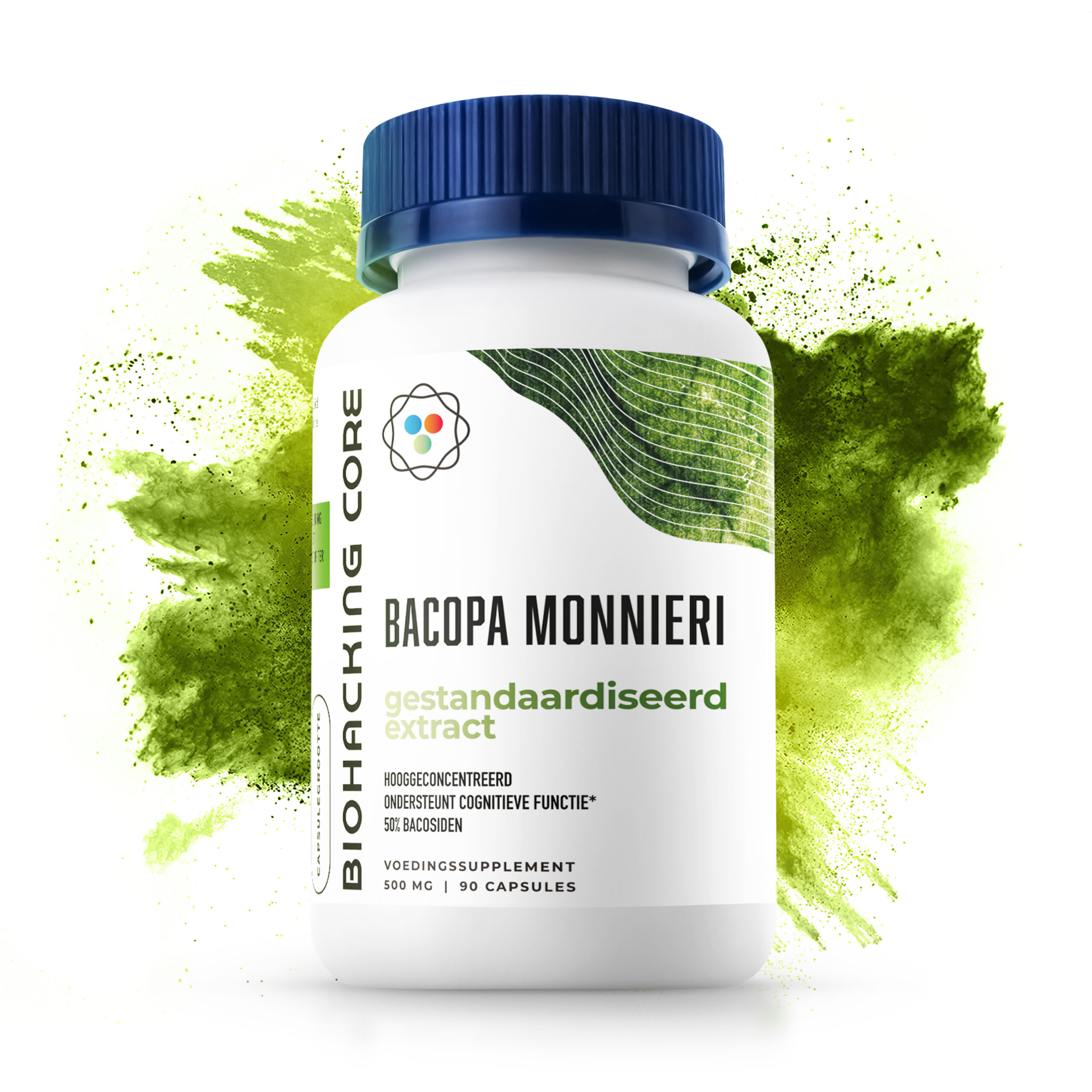

Bacopa Monnieri
- Category: Herbal extracts
Quantity
| Quantity | Discounted price | DISCOUNT |
|---|---|---|
| 3-5 | €21.80 | 5%€1.15 |
| 6-9 | €21.11 | 8%€1.84 |
| 10+ | €20.65 | 10%€2.30 |
Change your country
- Your Biohacking Experts.
- Mo-Fr Same day shipping for orders before 17:00.
- Free shipping for orders above 50eu.
- Superior Quality high purity extracts and compunds.
- Quantity based discounts applicable.
Product Overview
Biohacking Core offers Bacopa Monnieri Extract in encapsulated form, standardized explicitly to contain a minimum of 50% bacosides. Extracted from the whole herb, traditionally known as Water Hyssop or Brahmi, this product ensures precise potency, consistent purity, and reliable strength in each serving.
Key Features
- 450 mg Bacopa Monnieri Extract per capsule.
- Standardized to ≥ 50% bacosides for precise potency.
- Whole-herb sourced Bacopa Monnieri.
- Analytical testing confirms accurate bacoside concentration.
- Convenient and precisely dosed encapsulated form.
Ingredients & Supplement Facts
- Serving Size: 1 capsule
- Servings Per Container: 90
- Amount Per Serving:
- Bacopa Monnieri Extract (Whole Herb, standardized to ≥ 50% Bacosides): 450 mg
- Other Ingredients: Cellulose (capsule shell), Microcrystalline Cellulose, Magnesium Stearate.
Suggested Use
1 capsule daily*
Purity & Potency Statement
Biohacking Core Bacopa Monnieri Extract is standardized explicitly to contain a potent concentration of ≥50% bacosides, confirmed by analytical methods such as HPLC. Each production batch undergoes rigorous testing to ensure strict adherence to purity, potency, and consistent quality standards.
Packaging & Storage
- Packaging: 90 capsules per plastic bottle.
- Storage: Store in a cool, dry place, away from direct sunlight and moisture. Keep bottle tightly closed. Keep out of reach of children.
Warnings & Cautions
- For adult use only.
- Consult your healthcare provider before using this product if pregnant, nursing, taking medication, or have a medical condition.
- Discontinue use immediately if adverse reactions occur.
- Do not use if safety seal is missing or damaged.
Disclaimer
This product is a dietary supplement and is not intended to diagnose, treat, cure, or prevent any disease. This product is NOT medicinal, it is NOT a form of prescription or over-the-counter medication. This product should not replace a balanced diet or healthy lifestyle, it is not a replacement for any medicine or treatment for any health issues. Do not exceed the recommended daily dose. Always consult a medical or dietary professional before making changes to your nutrition. Follow the details on the label.
Latest Blogs
Stay Informed, Stay Ahead: Discover the Latest Insights in Biohacking

Designing Your Morning: Simple Practices to Start Your Day Intentionally
Mornings set the tone for the rest of your day. Yet, many of us start on autopilot—hitting snooze, gulping coffee,...
Read More
Mindful Breathing: Simple Techniques for Pausing and Centering
In the rush of daily life, it’s easy to get caught up in stress and lose our sense of balance....
Read More
Connecting with Nature: Incorporating Outdoor Time into Your Routine
Modern lifestyles often keep us indoors in climate-controlled homes and offices. In fact, people today spend around 90% of their...
Read More
Understanding Eating Schedules: An Introduction to Time-Restricted Eating Patterns
Imagine only eating during certain hours each day and giving your body a rest for the remaining time. This concept...
Read More
Exploring Cold Water Exposure: Understanding the Practice of Cold Showers
Cold water exposure – especially cold showers – has surged in popularity as a wellness trend in recent years. From...
Read More
Vitamin C & Brain Health: Optimize Your Intake
Like most, you’ve probably sought the assistance of compounds to optimize your cognition and brain health. Maybe you struggle with...
Read More
Level Up: Unearth Our Unsurpassed Quality!
CONTACT

2 reviews
I've been taking Bacopa Monnieri for a few weeks and notice improved clarity while studying.
Sinds ik Bacopa Monnieri gebruik, merk ik dat ik langer gefocust kan blijven zonder moe te worden.
Only logged in customers who have purchased this product may leave a review.